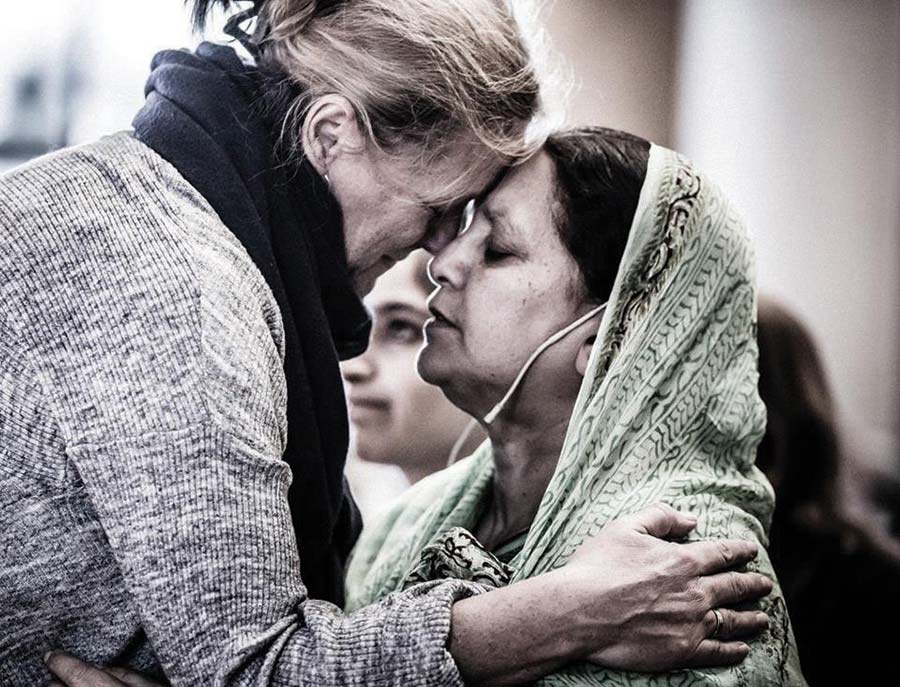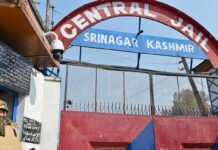Mother of five and a traditional homemaker, when her son disappeared in the custody of NSG, ParveenaAhanger launched a fearless campaign. It did not fetch her son’s but 27 years later, she is an acknowledged leader of her tribe of victims, a widely travelled woman who has spoken to world’s best universities and whose groups is the only one funded by a UN organization, reports Saima Bhat

From the monthly sit-in in Partap Park to Bergen Norway, for receiving Rafto award, Parveena Ahanger, the chairperson of Association of Parents of Disappeared People (APDP), has come a long way. The prize, which she shared with fellow human rights activist, lawyer Parvez Imroz, was in acknowledgement of their “decades of campaigning for human rights”
Norway’s Rafto prize is given to the human rights activists in the memory of Prof Thorolf Rafto on the first Sunday of every November.
“Parveena and Imroz have long been at the forefront of the struggle against arbitrary abuses of power in a region of India that has borne the brunt of escalating violence, militarisation and international tension,” the citation by the RaftoFoundation said.
“Their long campaign to expose human rights violations, promote dialogue and seek peaceful solutions to the intractable conflict in Kashmir has inspired new generations across communities.”
Unlike Imroz, Parveena has been a victim and an activist. She made monthly peaceful protests of the suffered families a successful movement. It was this protest that became her signature identity across the human rights groups across the world. Her APDP has evolved into a sort of the family in which the victims take care of each other.
It all started in 1990 when Parveena’s son was taken away by National security Guards (NSG) from her Batamaloo home in Srinagar. In order to search her son, she personally visited almost all the jails across J&K and some located outside. But she was the only woman who was trying to locate her son. There were various other families on the same mission. Those informal get-togethers laid the informal basis of the APDP. Soon, they printed a long list of the youth who had vanished. It listed 113 names and was drafted by a lawyer, Mohammad Ashraf. Then, Imroz had written some of the writ petitions in various cases, including that of Parveena.
The members of this informal group would paste copies of that list on the walls of the district and High court. They would assemble near it but police would invariably disrupt them. Usually, police would beat them and some of the women would routinely fell unconscious. Finally, they started meeting at Parveena’s home.
They tried creating a memorial in city outskirts near Narbal. But the day the foundation stone was to be laid, police ransacked the spot and beat all the APDP members.
“Then we started assembling in Sheri Kashmir Park but the venue finally got shifted to Partap Park, where we conduct monthly peaceful protests,” Parveena said, insisting these gatherings are memorial meetings, places where they remember their missing ones.
Back home, Parveena’s in-laws, her husband included, were unsupportive of her. But the “rebel” being a mother was uncompromising. She would go from newspaper to newspaper and get the details about missing people published.
Gradually, others from the periphery would contact her and ensure the details of their missing wards are recorded. These relations evolved to the extent that Parveena started visiting them. Her first support and companion was her neighbour, Habib Ullah Bhat, now, no more. His son was also taken away by the army without leaving any trace behind.
Every day after sending her other children: three more sons and a daughter, to school she used to leave with Bhat and visit far-flung areas to persuade other families to get ready to fight for justice.
“Usually we would return by7 pm,” she said.She turns melancholic while recalling those days. “I was wandering in Jammu jails for my son and my neighbours bought books for my daughter. I had left everything and as a result, my husband and in-laws started behaving differently with me.”
Movement, then, was not easy. North Kashmir was heavily under Army and south Kashmir was under Ikhwanis. Moreover, convincing families of disappeared ones were more difficult. “Many families in south Kashmir either shut the doors on my face or had fear that if they talk to me, Ikhwanis will get to know about it and then they will torture them and take other members as well. That was the time when documentary Papa 2 was being shot; you can watch that film and see how young I was,” Parveena said.
With people hurling abuses at her, saying it has become her ‘job’, Parveena says she continued her mission. The objective was to first file an FIR as police had not registered any FIR in any disappearance case.
Parveena started reporting all these cases to Imroz and he would file cases, heabus corpus petitions, in the court. Finally, in 1994, both started formally registering the cases under the banner of APDP. With him, she went to Delhi in (2005) for a number of seminars. But in 2006, both the founders split the group when Imroz, according to Parveena, started Jammu and Kashmir Coalition of Civil Society (JKCCS). The party split divided the members too.
The judicial process took its own time and the custodial disappearance was established in most of the cases. It took 12 years but, then, there were no formal orders for directions to register FIR.
In February 2007, when unmarked graves were found in Ganderbal, Parveena was one of the 100 women and men, who left for Delhi in a bus. “We met at Jantar Mantar and had a hunger strike. A number of local advocates and human rights defenders participated with us. We were there for ten days. And when we were about to return home, the highway was closed because of weather. With the meagre money, we decided to stay in an Ashram in Jammu and then next day we crossed Panthal range by foot.”
Once she came in the international attention, the similar groups in other countries and the human rights groups started inviting her. Parveena has travelled extensively in last many years.She visited Philippines (2000), Thailand (2002), Indonesia (2003), Chiang Mai (2006) where she attended a conference with Iffat Fatima, with whom she had shot a film as well, Cambodia (2009) and London (2014). In the UK, she spent a month in London where she visited all top universities including Oxford and Cambridge and gave lectures on the issue of disappearances
In 2008, Parveena got a call from United Nations (in Geneva) to represent her cases. But she went with seven more cases Advocate Varindra Grover was accompanying her. “I thought to have my own case of Javed Ahmad Ahanger only won’t make any big impact so I took along seven more cases of Sajad Ahmad Bazaz, Javed Ahmad Matoo, GhulamNabi Bhat, Gowhar Ayub, Shabir Hussain Bhat and one more.
Parveena says UN group wanted to come to Kashmir and meet the victim families but the group was granted a visa for just 24 hours and that was given after one year. After UN group’s visit, her APDP was sanctioned a grant of US $10,000 dollars per year in 2010.
As the grant news created tensions within the extended APDP family she got them to Srinagar and explained them the grant’s use: on documentation, for managing sickness of the victims, education of children and their food.Parveena says APDP is registered as a Trust, and not as an NGO. This prevents her seeking and receiving foreign contributions.
Parveena claimed her group is taking care of 400 families of disappeared people and manages their basic needs of food, medicine and education. Every year, with the help of local donations, Parveena says she manages to help in marrying children of disappeared persons. Till November 2017, she said APDP helped five boys and girls to get married.
Parveena said the extensive coverage gets her students from across the world who work with APDP.
“Human Rights is a subject now,” she says. “Students from America, London, mostly from Delhi based universities, Tata University come and do their internships with us. They fight with their university administration to take up researches on human rights violations including disappeared, rapes, torture in Kashmir but our own universities doesn’t allow our own kids to study it.”
When Parveena started searching for her son in 90’s she was sure that soon she will get his address. No whereabouts after 27 years struggle. But the lady said she had two cases against her both going on in the court.
“One is there for 12 years now, for conducting a rally with Imroz and another for establishing a remembrance stone in Martry’s graveyard in Eid Gah. That remembrance stone was later dismantled and I along with Imroz and other 10,000 members of APDP bought a small piece of land,15marlas in Lawaypora where they had their remembrance stone.” Everything is shattered like that remembrance place, half of which has been taken over by the state government.















